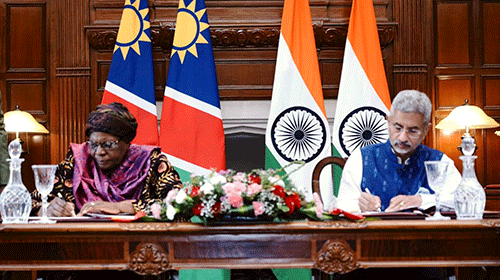The request by the Indian government for Namibia to repopulate its extinct cheetah population is becoming a reality as the two nations signed a landmark agreement on Wildlife Conservation and sustainable biodiversity utilisation.
The agreement has a strong focus on wildlife conservation to which both countries attach high importance.
Shedding light on the promotion and sharing of good practices in technological applications and livelihood generation for local communities living in wildlife habitats, High Commissioner of India to Namibia Prashant Agrawal said the commission has been fortunate to facilitate this agreement.
The project will enable the transfer of a few cheetahs from Namibia for introduction back into India’s wilds.
“ The cheetah is the only large carnivore that has gone extinct in India post its independence, and their introduction back has a special significance as India marks its 75th independence anniversary this year,” shared Agrawal.
He said: “This unique intercontinental trans-location would be the first-of-its-kind project ever, and therefore has global attention. It will reaffirm our shared commitment to conservation. These cheetahs would be the goodwill ambassadors of Namibia, and this friendly gesture on the part of Namibia is deeply appreciated by the people of India.”
Agrawal informed that all necessary preparations and training are underway to welcome the first cheetahs from Namibia to Kuno National Park in the State of Madhya Pradesh.
“The Kuno National Park has been identified as the first site for the project. Authorities in this regard have done necessary preparations and resource allocation. The site has no human settlement, and is ready for the introduction of cheetahs with minimal inputs,” reiterated Agrawal as reported early this year.
Negotiations to bring the cheetah back to India were presented in 2009 by the Wildlife Trust of India, where experts from across the world and government officials met and decided to conduct site assessments to explore ways of going about the situation.
Namibia is known to be the first African country to slot the protection of the environment into its constitution, and the government has strengthened this by giving its people the opportunity and right to manage their wildlife through communal conservancies.
Agrawal mentioned that a few more cheetahs might be requested later once these establish themselves well in India, in order to have a viable population. He added that the technical aspects are being coordinated through Cheetah Conservation Fund in the utmost scientific, professional manner.
International relations minister Netumbo Nandi-Ndaitwah said it is important for both Namibia and India to explore opportunities in the sectors of interest to both countries. Namibia and India have excellent bilateral relations, as reflected by the frequency and reciprocity of high-level visits and meetings.
Nandi-Ndaitwah is in India for the 17th CII-EXIM Bank Conclave on India-AfHCd Growth Partnership and several significant bilateral engagements.
“Namibia has taken a deliberate decision to facilitate investment in the growth points such energy, water, agricultural, oil and gas, technology, tourism, health, education, and mining (with emphasis on value addition) among others.
Subsequently, laws and policies friendly to investors are in place and continue to be reviewed to meet the demand,” she stated.
Nandi-Ndaitwah added that bilateral trade as witnessed, increased trade between India and Namibia, which stood at US$252 million (N$4.2 billion), between 2021-22, for the first time in a decade. Out of this, Indian exports to Namibia were worth US$206 million (N$3.5 billion), mainly petroleum products. According to the latest report of the Namibian Statistics Agency, when it comes to Namibian imports, India has become the second largest partner (after South Africa).
– psiririka@nepc.com.na


